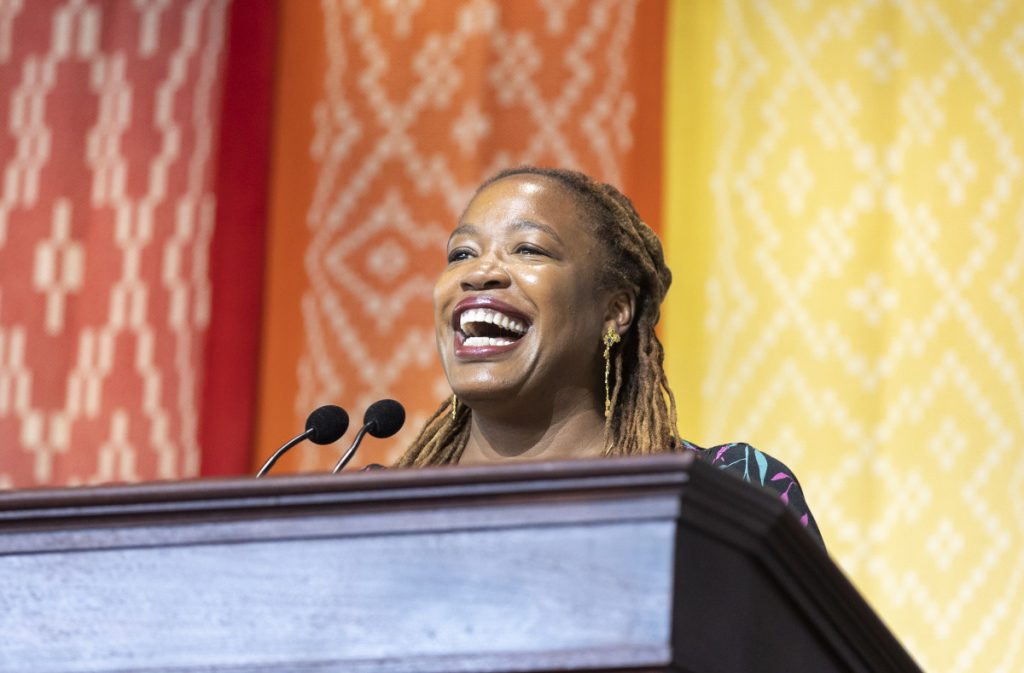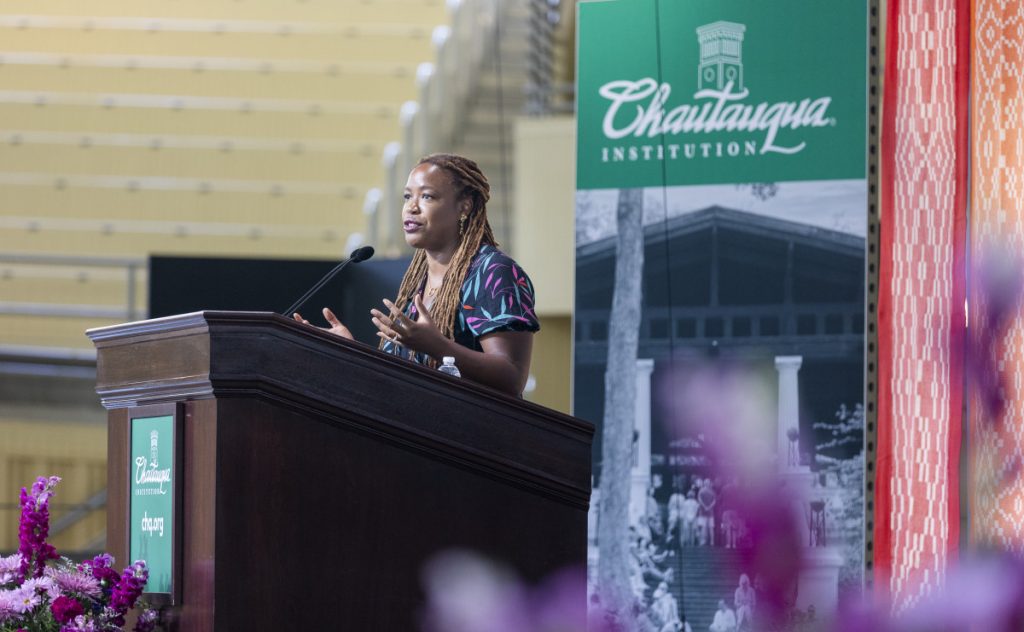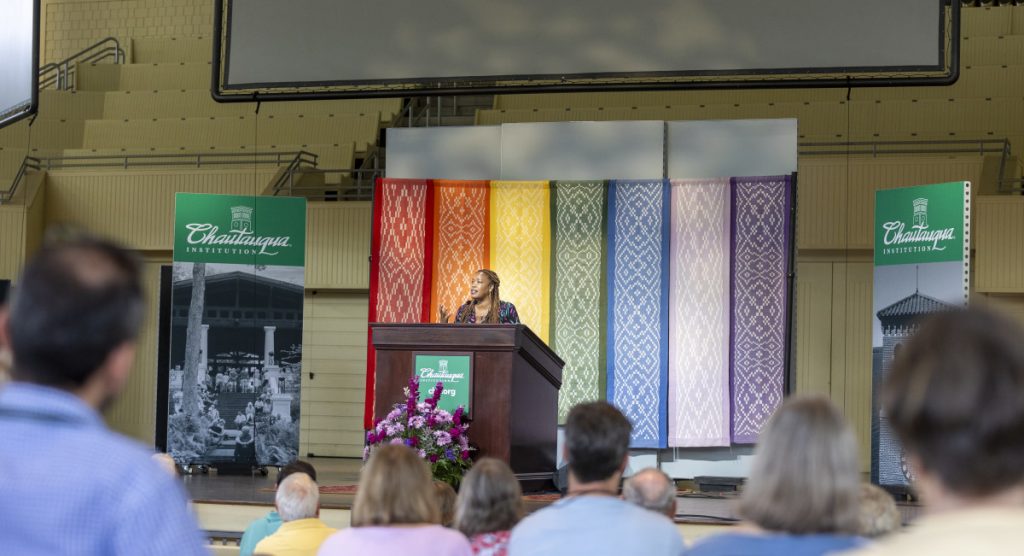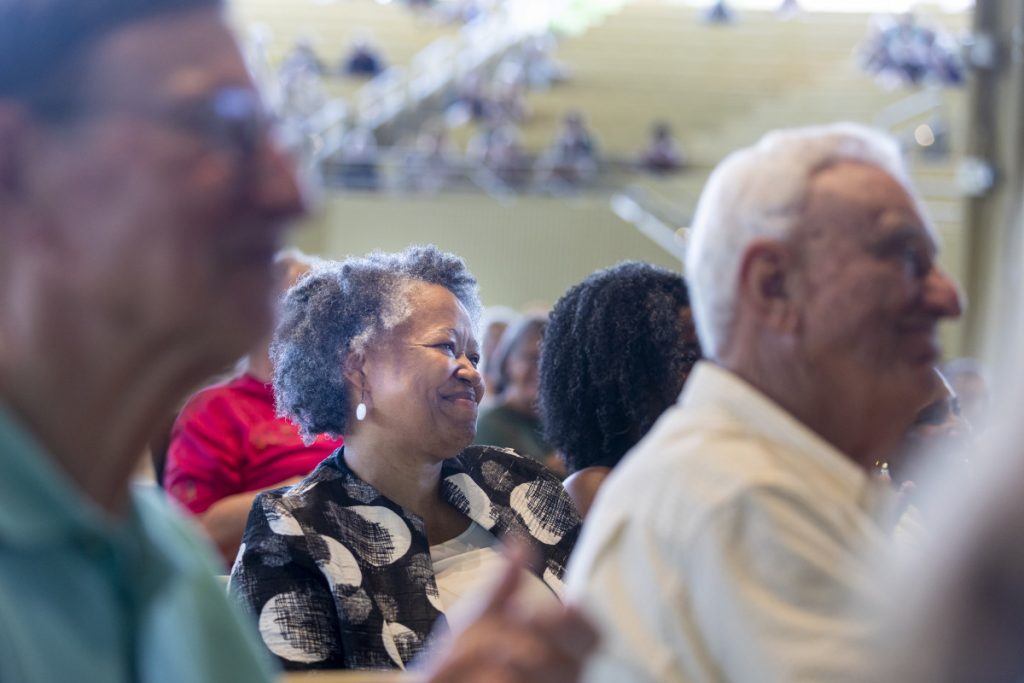MAX ZAMBRANO – STAFF WRITER

For 20 years, Heather McGhee was an “economic policy wonk,” as she put it.
Working at the think-tank Demos and earning a juris doctorate degree from Yale University, McGhee spent those decades focused on understanding how and why the United States struggled with issues ranging from affordable health care, child care and education, to a lack of climate change initiatives and restricting voting rights.
“We, supposedly the greatest nation on the planet, are watching our infrastructure crumble,” she said. “It gets a D-plus from the American Society of Civil Engineers.”
Over the last 40 to 50 years, McGhee said, the economy has shifted from a football shape, where there was a strong middle class and narrow ends of low- and high-income citizens, to a bowtie shape with a narrow middle class and bulging ends of low- and high-income citizens.
In 2017, McGhee stepped down as Demos president in order to answer the question of why the U.S. now supports policies that deliver tax cuts to the rich and stifles its middle class, she said, something her training and experience hadn’t quite taught her.
She circumnavigated the country multiple times, talking to hundreds of people, she said, and then wrote down her answers in her February 2021 book, The Sum of Us: What Racism Costs Everyone and How We Can Prosper Together.
McGhee, a regular guest on “Meet the Press,” “Morning Joe,” “Deadline White House” and “All In with Chris Hayes,” presented a few stories and findings from her travels and book on Tuesday, July 13 in the Amphitheater, part of Week Three’s Interfaith Lecture Series themed “The Ethical Foundations of a Fully Functioning Society.”
The first experience she shared, which was one of the first stops on her trek, came from a visit to the Harvard Business School in Cambridge, Massachusetts.
McGhee met with two scholars who walked through the methodologies and findings of a 2011 study titled “Whites See Racism as a Zero-Sum Game they are Now Losing.” Zero-sum means one’s gain is another’s loss, such as the U.S. House of Representatives — every 10 years, some states gain more representation, while others must lose to keep the number at 435.
Seeing this zero-sum theory applied to race, a light bulb went off in McGhee’s head. White people, in general, believe a dollar more in other pockets meant a dollar less in theirs, an anxiety stoked by right-wing politics of the Obama era and flamed by the winners-and-losers, us-versus-them rhetoric of the Trump presidency, McGhee said.
However, McGhee said it was not a zero-sum game.
“If we’re on a team, and we have so many players sidelined due to debt, discrimination and disadvantage, then they can’t be on the field scoring points for the team,” she said.
At some point, she said, a story began that not everyone was on the same team, and some believe it. McGhee wanted to find that origin.
For one, she said zero-sum ideology couldn’t be natural. Although humans do compete, she said people of color view the world far less in an us-versus-them mentality.
“We generally don’t see that our progress has to come at the expense of white folks,” she said. “We see the world more through a win-win, mutual interest ethos.”

This story, McGhee said, was invented at the outset of the country’s economic model during a time of colonization, when enslaved people and indentured workers with no land were forced to work for the rewards of their owners.
“That spoiled system, that allowed so much concentration of land and power for so little work from people who were owners in that society, was always at risk,” she said. “The few are always going to be at risk of the oppressed many.”
McGhee grappled — particularly as a descendant of enslaved people — with the realization that the system did not have to be a zero-sum scenario. Using “radical imagination,” she said one must consider what the country would look like otherwise.
She described this system as one of the worst elements of our society, which benefits only a few instead of serving a nation full of people from around the world.
The zero-sum system has been maintained through continuous division, exploitation and oppression, she said, through the Industrial Era and into the present day.
Another light bulb turned on in Montgomery, Alabama, McGhee said. Here sits Oak Park, part of a nationwide New Deal creation of public resources and amenities.
“Public parks, bridges, libraries …” McGhee said, pausing. “And swimming pools.”
In this era, the government was committed to providing a decent standard of living to its people, including social security for the elderly, large numbers of subsidized affordable housing for workers and government subsidies which allowed working class citizens to mortgage their own homes.
McGhee said these plans included the G.I. Bill, allowing veterans to attend college for free. Additionally, people had more power to negotiate wages.
“It was the highest standard of living in the world in the early 1950s,” she said. “Yet, virtually everything I just described was racially exclusionary.”
Social security, for one, excluded agricultural and domestic work, the two largest sectors of Black workers, McGhee said. The federal government drew red “do not lend” lines around Black and brown neighborhoods on maps of the country. During the subsidization of affordable housing, developers were required to make homes available only for Caucasians. The G.I Bill appeared race neutral, but benefits were filtered through segregated sectors, she said.

As for the swimming pools, local ordinances and laws — or simply violence and intimidation — kept Black residents away.
“Even though generations of Black Americans had contributed to these public goods through tax dollars and hard work, they were often — usually — excluded,” McGhee said.
During her walk through Oak Park, McGhee stepped on and around a large grassy section, once home to the park’s public pool. On Jan. 1, 1959, facing threats to integrate the pool, Montgomery’s all-white city council unanimously voted to close the pool, McGhee said. The city’s parks and recreation department was shut down for a decade.
“They even sold off the animals in the zoo, y’all,” McGhee said.
The same decision to close public pools and other spaces was not singular to Montgomery, but occurred all over the country — from Baltimore to Washington State to New Jersey, Ohio and West Virginia, to name a few, McGhee said.
“This idea of drained-pool politics helped … explain how we went from a country that invested trillions, in inflation-adjusted dollars, in high economic opportunity and security … to embracing the kinds of drained-pool policies that moved things from public goods to private costs,” she said.
The idea that upper-middle-class families would rather build private pools in their backyards or purchase private pool memberships made sense to McGhee because of research she did on higher education at Demos.
McGhee was curious why free college disappeared in the U.S. She said between the 1970s and ‘90s, when a college degree became essential to accessing middle-class security, the government began draining its pool of resources.
She said Black families have the largest burden of student loan debt, and that eight out of 10 must borrow money to attend college. However, six out of 10 white families now have to borrow, too, she said.
“When you drain the pool of public goods, the costs go up for everyone,” she said.
Another example she gave was the United States’ historic lack of universal health care. President Harry Truman, she said, pushed for the measure only to be shut down by the Southern Dixiecrat caucus of his own party. The Affordable Care Act, colloquially known as “Obamacare,” was opposed by a party that sold its message in racialized terms, McGhee said.
“Today, white Americans are still the largest group of those who go without health insurance, and yet the majority of white Americans have been disapproving of ‘Obamacare’ since it was signed into law,” she said.
The Supreme Court, McGhee said, struck down an expansion of Medicaid that would have raised the level of the Affordable Care Act’s eligibility to more members of the middle class — she argued this would have benefited fast food and retail workers whose employers do not provide health care benefits.
“We saw they used a states’ rights theory to say the federal government had no right to expand Medicaid in every state,” she said. “And what ended up happening? We saw a new kind of Mason-Dixon Line of health care where most of the former Confederate states said, ‘No, thank you,’ and most of the northern states said, ‘Sure.’ ”
Drained-pool politics, then, is the answer of why the U.S. devolved from the greatest middle class in the world to the modern developed world’s most unequal society, McGhee said.
She sees signs of hope across the country, however, sometimes in what she called the most unlikely of places. McGhee calls these signs “solidarity dividends,” or the idea these gains can only come through multiracial teams finding common solutions to common problems.
For example, in Kansas City, McGhee met a fast food worker, a white woman who, for most of her life, believed in the zero-sum theory.
“She was anti-immigrant,” McGhee said. “She thought that Black people were cheating, were lazy, were on welfare, and yet she also — I think in many ways because of that embrace of the hierarchy of human value — didn’t believe that her own labor would ever be worth more than $7.25 an hour, even though she worked so hard and struggled with her husband and three children to make ends meet.”
Approached by a coworker who said they were organizing a fight for $15 an hour, the woman initially felt undeserving and unmotivated, but she attended the first organizational meeting anyway.

At that meeting, a Latina woman told her story, one of a life trapped in a two-bedroom apartment with three kids, a spouse and bad plumbing.
“(The fast food employee) told me, ‘I saw myself in her for the first time,’ ” McGhee said.
The woman signed up that night, and that organization won a ballot initiative in Kansas City to raise the minimum wage. McGhee said she is now one of the multiracial leaders across the country fighting for a $15-an-hour minimum wage.
Another story of solidarity dividends is based in Maine’s second-largest city of Lewiston, where alcoholism, loneliness, isolation, suicide and opioid addiction ran rampant. It was an old mill town, and it was dying, McGhee said.
There, McGhee met two Franco-Canadian residents. Hoping to bring the town back to life, rather than succumb to addiction and loneliness, the two were willing to join forces with a new wave of residents, including Africans, Muslims, refugees and immigrants.
They began attending the French Club, McGhee said, where West Africans could reteach the two a language they ceased using to assimilate in the community. In community unity efforts, old and new Mainers joined forces and helped lead their soccer team to five state championships, based on immigrants’ and refugees’ love of the game, McGhee said.
Now, McGhee said, Lewiston is a thriving city with new jobs, schools and a rekindled Main Street — once entirely boarded up, now filling back up with small businesses.
Lewiston had a choice, McGhee said: to continue down its path, with the local mayor and governor continuing to drain the pool, or for other local leaders and white and Black workers to join together. She said she’s seen examples of Lewiston across the country.
“I saw in people who put aside the zero-sum and linked arms across lines of race the glimpse and confidence of a new kind of America, unflinching, unafraid to own the full weight of our collective history, crystal clear eyes in whose interest that division has always been used,” McGhee said.
She said the old zero-sum story is one founded on lies that children don’t want and the planet cannot support.
“In this spirit of rebirth and healing after a year and a half of national and global catastrophe, I’ve been going across the country, virtually, talking about ways we are stronger together, ways we can be more than the sum of our parts,” McGhee said, “when we reject the zero-sum lie and fight for a future in which we understand we are so much greater when we fight for the sum of us.”




